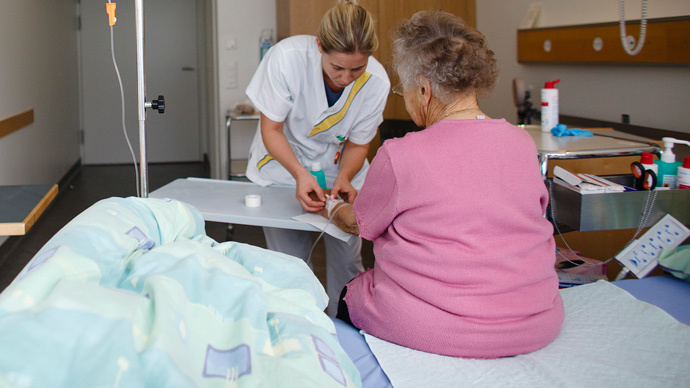Alzheimer's symptoms could appear 18yrs before diagnosis – study

Alzheimer's disease is usually recognized in old age, but early symptoms could appear up to 18 years before it is officially diagnosed. A new study suggests that mistakes made during memory and thinking tests could be warning signs of the disease.
The study, led by Kumar Rajan from the Rush University Medical Center in Chicago and published in the journal Neurology, examined 2,125 people with an average age of 73. The participants were given a test of memory and thinking skills every three years, for 18 years. All of the volunteers were either European-American or African-American, and none had been diagnosed with Alzheimer's when the study began.
Over the course of the study, 23 percent of African-American and 17 percent of European-Americans developed Alzheimer's. Those who scored lowest on the memory and thinking tests during the first year of the study were 10 times more likely to develop the disease.
“The changes in thinking and memory that precede obvious symptoms of Alzheimer’s disease begin decades before,” said Rajan.
“While we cannot currently detect such changes in individuals at risk, we were able to observe them among a group of individuals who eventually developed dementia due to Alzheimer’s.”
Scientists find link between brain & immune system to fight Alzheimer’s, autism http://t.co/aF1y3lXFkvpic.twitter.com/Of7rtmj17F
— RT America (@RT_America) June 6, 2015
The most revealing years of the research were in the later phase – from 13 years after the study began. During that time, every unit of lower performance in the tests was associated with an 85-percent greater risk of developing the disease. The study considered a unit to be a standard drop below the average score.
“While that risk is lower than the same one unit lower performance when measured in the year before dementia assessment, the observation that lower test scores 13 to 18 years later indicates how subtle declines in cognitive function affect future risk,” Rajan said.
The results indicate that physical and biological changes take place in the body before memory and thinking impairment are typically recognized.
"If this is so, then these underlying processes may have a very long duration. Efforts to successfully prevent the disease may well require a better understanding of these processes near middle age," Rajan said.
Nearly 44 million people worldwide have Alzheimer's or a related dementia, according to Alzheimer's Disease International. Almost two-thirds of those affected are women.
Want a cake? Think twice, high blood sugar increases risk of Alzheimer's, new study claims http://t.co/4S3OVYjcXTpic.twitter.com/5DRiPOVL7x
— RT (@RT_com) May 7, 2015
A recent Alzheimer's Association report estimated that women aged 65 have about a one in six chance of developing the disease during the rest of their lives – compared to a one in 11 chance for men.
It was previously speculated that females were more likely to develop the disease simply because they tend to live longer than men. However, scientists are now starting to question this assumption.
"There are enough biological questions pointing to increased risk in women that we need to delve into that and find out why," Maria Carrillo, chief science officer for the Alzheimer's Association, told AP.
Last year, researchers from Stanford University began doing just that. They analyzed records of more than 8,000 people for a form of a gene called ApoE-4, which is known to increase the risk for Alzheimer's.
Women who carry a copy of that gene variant were approximately twice as likely to eventually develop Alzheimer's as women without the gene. However, the risk to men with the gene was only slightly increased.
It is unclear why this was the case, but University of Southern California professor Roberta Diaz Brinton believes it may be related to how the gene interacts with estrogen.
However, that still remains speculation for the time being. Years ago, a study found that estrogen therapy after 65 might increase the risk of dementia. But later research showed that hormone replacement near the onset of menopause wasn't a problem.












